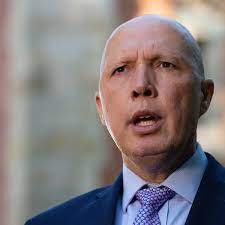Australian Defence Minister Peter Dutton has suggested the Solomon Islands government signed a security pact with China after being bribed.
As the fallout from the national security scare continued to ricochet through the election campaign, Dutton also indicated that Australia’s much-criticised low-level diplomatic response to try to stop the pact being signed was based on advice by the national security apparatus.
“We don’t bribe people, the Chinese certainly do, and they’ve demonstrated that in Africa and elsewhere. People can draw their own conclusions.
“We can provide support, but we can’t win a deal at the end of the day if somebody’s relying on a corrupt payment.”
A former diplomat said no evidence had emerged that China bribed politicians but “everyone assumes it does happen”.
“It’s well known that money politics is a huge factor in how decisions are made in Solomon Islands politics.”
The former diplomat said Chinese businesses and state-owned corporations often made deals with politicians as a starting point for Beijing’s influence peddling.
“They do get directed to build certain relationships that will benefit Beijing in the end.”
Chinese money overtly flows to Solomon Islands MPs in one of two ways.
First, Beijing contributes to the National Development Fund, a slush fund controlled by the Sogavare government.
Second, newly elected Solomon Islands MPs are often given an all-expenses trip to China early in their terms, where they are wined and dined. They receive a per diem allowance, which they can pocket because they don’t need to spend it. For many, the allowance is enough to support their family for a year.
Opposition Solomons MP Peter Kenilorea said the security deal was unpopular in his country and warned the possibility of unrest over it could be exploited by Mr Sogavare to invoke it in a self-fulfilling prophecy.
He said former prime minister Danny Philip told a panel discussion on Thursday the final agreement was largely unchanged from the leaked draft version.
Kenilorea said there did not appear to be any hindrance to China acting quickly on the deal, including deploying personnel within weeks to cement Beijing’s grip.
“There is heightened tensions, particularly in certain segments in society,” he told The Australian Financial Review.
“There is still uncertainty over what this means for us on the ground. The irony is those tensions would be the justification [for invoking the agreement].”
There are concerns the agreement, the draft of which allowed China to send police and military personnel to the Solomon Islands “to assist in maintaining social order,” while also opening the door for Chinese warships to stop in port there for “logistical replenishment”, could allow the superpower to establish a naval base.
But respected Pacific Islands expert Dr Transform Aqorau downplayed some of those concerns, thanks to the nature of the nation rather than the agreement itself.
“I think it’s unlikely for the very reason that it’s actually very difficult to secure land and space in Solomon Islands.
“We’re struggling with Bina (Harbour) to build a tuna base there and so because land is customary land and so to the extent that, you know, it’s fraught with those challenges, I think it is not as easy as people think it’s going to be.” Dr Aqorau said.
Opposition leader Matthew Wale has promised to tear up the agreement should he gain power.
Dutton said he had not seen any intelligence to suggest Chinese military personnel and equipment could be in the Solomons within a month but did not dismiss the possibility.
He said the government had been aware and concerned for “some time” of the prospect of such a deal.
“We’ve been working behind the scenes based on the advice of the experts,” he said.
Dutton said Labor’s criticisms of the “Pacific Stuff-up” were motivated by “crass political reasons” that were worsening the situation and damaging Australia’s reputation.
“They haven’t had the security briefings we’ve had, they haven’t had the intelligence briefings we’ve had.”
He noted that New Zealand had not sent its prime minister or foreign minister either.
SOURCE: AFR/PACNEWS














